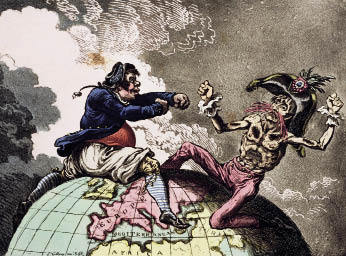On the first page of this book there is a sentence so extraordinary that I had to read it several times to make sure my eyes weren’t playing up.
On the first page of this book there is a sentence so extraordinary that I had to read it several times to make sure my eyes weren’t playing up. Despite what the English and French may say about one another in public, writes Stephen Clarke, the truth is that ‘we find each other irredeemably sexy’. If only this were the case. Alas, as the would-be English Lothario bruised by yet another dismissive ‘Non!’ knows only too well, the traffic tends to flow in just one direction.
Mercifully, Clarke is a lot less even- handed in his history of Anglo/French relations. At the heart of it is one eminently palatable — for us, anyway — contention; namely that everything good that has happened between our countries over the last millennium has been down to English ingenuity and decency. Whereas everything bad . . . Here the impartial finger points unswervingly towards French duplicity and sulkiness.
Take the murder of Thomas Becket. Traditionally, French involvement in Becket’s murder has been thought to be slim — non-existent even. However, Clarke does a valiant job of laying the blame on them. If Becket had not spent two years in France picking up all kinds of scurrilous ideas, he argues, Henry II would have felt no compulsion to send his knights to teach him a lesson. Why, the man virtually committed suicide by impaling himself on their swords.
The Hundred Years War? Plainly, the French started it, and then compounded the damage by proving themselves to be astonishingly bad losers. If you visit the site of the Battle of Crecy today, you will find a little plaque bearing the following explanation for the French defeat: ‘The troops were blinded by the sun, which was shining again.’ And who made it shine? I think we can guess.
Onward to Joan of Arc. The fate of Joan has long been a source of great bitterness to the French — despite giving rise to their oft-repeated joke that she’s the only thing the English have ever cooked properly. Yet it was the French themselves who turned on Joan — believing her to be a witch — and the only person who showed her any compassion as she stood in the flames was an English soldier who put two sticks together to form an improvised cross.
As for bravery . . . Here, I think we need look no further than 1797 when 1400 French troops attacked Bristol. Or rather they didn’t. Blown off course, they landed in Wales, where they got drunk and surrendered to a group of red-cloaked Welsh women whom they mistook for soldiers.
Regrettably, the next 150 years saw no discernible improvement. As everyone knows, when the British generously offered General de Gaulle a home during the second world war, he did not behave at all well — ‘Like a female llama surprised in her bath’, as Churchill put it. The BBC radio broadcast De Gaulle gave in June 1940 was intended as a rallying cry to the Free French, and today is regularly hailed in France as the most famous speech in the country’s history. The only problem is that very few people actually heard it, and a mere 300 of the 10,000 French living in Britain at the time volunteered to join De Gaulle as a result.
No one could doubt the depths of Stephen Clarke’s scholarship, or indeed his prejudice. However, his book, I suspect, is way too long even for the most rabid xenophobe, with the 1066-And-All-That-ish humour frequently buried beneath an extended history lesson. Only in the latter stages does it develop some real zip and zing.
However, 1000 Years of Annoying the French did manage to do something I would not have previously thought possible; it made me feel sorry for Nicholas Sarkozy. When he and his wife visited Britain in 2008, Sarkozy gave a speech to the Commons suggesting that the Entente Cordiale should be upgraded to the Entente Amicale. Immediately afterwards, the Sarkozys were taken to the Royal Gallery where they were proudly shown two of its prize exhibits: vast paintings depicting the French defeats at Trafalgar and Waterloo. Later that day, en route to Windsor Castle, they were escorted by the Household Cavalry, whose breastplates are copies of those taken from dead French cavalrymen at Waterloo. And the name of the leading horse in the parade? An extra big nosebag for that noblest, or at least most provocative, of steeds, Agincourt.






Comments